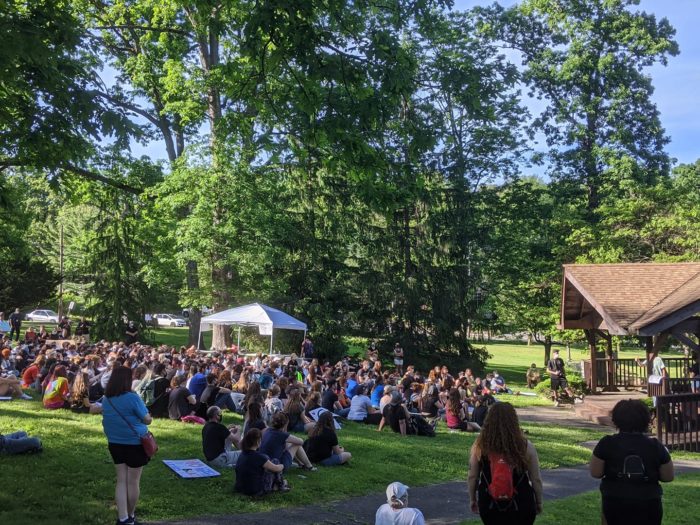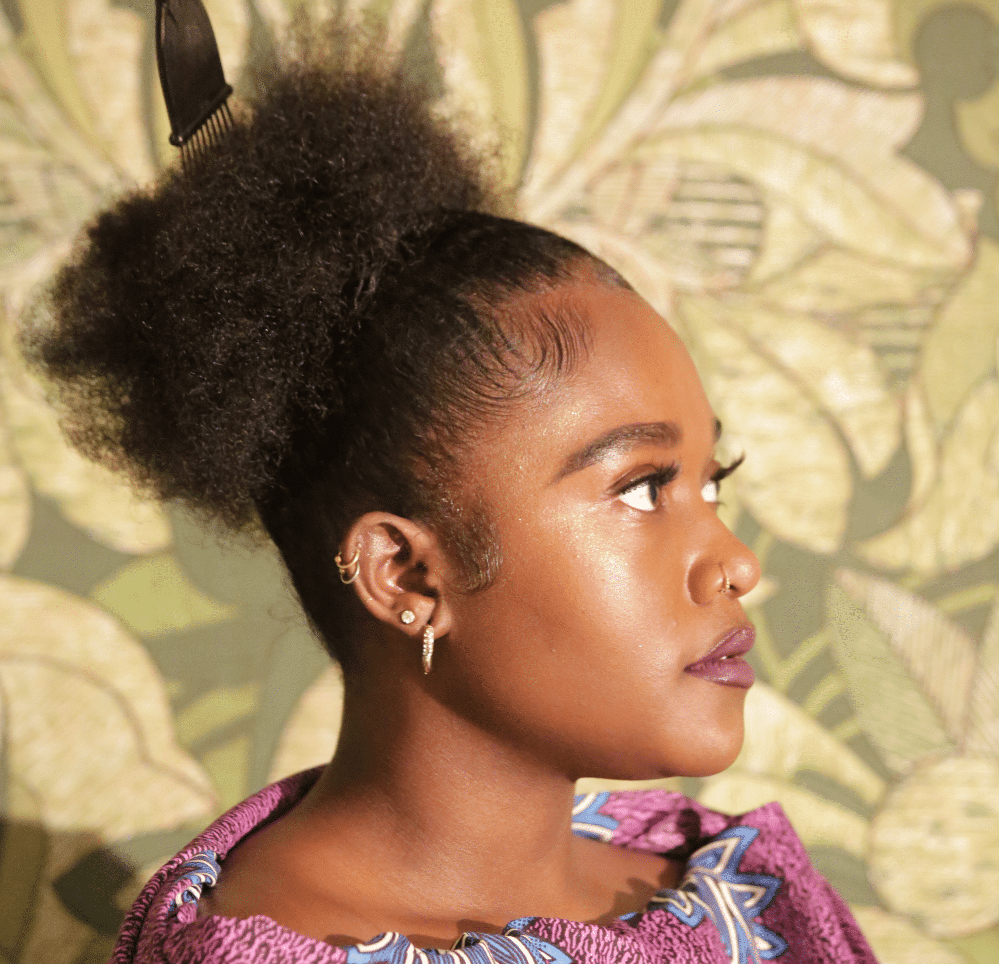Outrage over racism and police brutality epitomized by the murder of George Floyd has been so pervasive that away from big cities, many smaller communities have also seen protests. On June 8, the sleepy suburban town of Hopatcong, New Jersey showed its solidarity with the Black Lives Matter movement. A couple hundred residents turned out to a rally at Modick Park in the town’s center.
It was a surprising sign for a town not known for political activism of this sort—that, at least, is how I would describe the place that I called home until I was 18 years old.
“It was cute to see that they made an effort with the protest,” said Jeanette Larosiliere, a 25-year old Black activist. Larosiliere (above) also lived in Hopatcong, until she graduated high school. “It was a lot of white people, but it’s cool to see white people at these protests unify with us. I’m hoping the people of Hopatcong came out to show unity and say we’re in this together.”
Larosiliere has more recently lived in and around New York City. She didn’t initially plan to show up to Hopatcong’s protest, but her younger sister, who still lives there, urged her to. “She said with everything that’s going on and everything we went through in our schools, she told me we had to show face and make a point.”
Larosiliere also described the crowd as mostly young—teenagers, high schoolers and young adults, with a few older and middle-aged residents. She estimates that 20-30 uniformed Hopatcong police officers were present to keep the protest in “approved” areas of the park.

Hopatcong is a suburb about an hour outside of New York City, located in rural and mountainous Sussex County. Per 2010 census data, of over 15,000 residents, 91 percent are white; just 0.11 percent are Black or African American, 0.02 percent Asian American, and 11 percent, like myself, Hispanic or Latinx of any race.
The town is traditionally Republican and conservative. All of its city council members, its mayor, all three of its state representatives, and all of its elected county officials, including five commissioners and a sheriff, are Republicans. Hopatcong has gone Republican in every presidential election of the past 15 years.
I asked Larosiliere more about her experience growing up as a Black woman in Hopatcong, how police have treated her peers, generational divides in the Black community, and how we can all be better activists. Our interview has been lightly edited for length and clarity.
Alexander Lekhtman: What was it like to grow up as a Black woman in Hopatcong?
Jeanette Larosiliere: Growing up in this town, Black women didn’t get much love or appreciation. We had plenty of racial slurs and jokes pointed at us. I used to just laugh with them, thinking it was all a joke, but now that I’m older I understand they were being racist.
My sister was lighter-skinned, so I always wanted to be lighter and I never felt like I was pretty. There was a lot of competition between Black women—people wanted to know, who was “the prettiest Black girl.” But why? What were we competing for? We’re all Black and beautiful, we all have unique features. It’s upsetting now, looking back on how our peers treated us.
What was the difference you saw when you moved away?
I felt much more appreciated in New York. Guys of all races showed me more love and attention. I don’t know if it’s because urban areas are more diverse, but it was much healthier for my self-esteem as a Black woman.
What is your experience with police, either personally or within your community?
Luckily, I’ve never had a bad altercation with police. But I’ve witnessed and observed how police treat my boyfriend and see him as a threat. He’s been handcuffed and brought into the station several times. My sister has also told me many times about how police have stopped her, and she felt racially profiled. I try to avoid cops—I don’t particularly like them.
Do you see disagreements within the Black community on some of these issues, perhaps by generation?
I largely feel that all Black people are standing together, finally. There are definitely some older people in my family or community who disagree with some of the tactics of the protests and riots. They say, “We as Black people kill each other more than white people or police do to us.” They say, “Only peaceful protests.” I just roll my eyes at it. But I feel like our younger generation is much more unified. It’s like, “by any means necessary.”
I also feel like our younger generation is much less Christian than our older folks. I pray for my family’s safety, but I don’t go to church. I don’t necessarily feel like Christianity plays as big a role in this modern civil rights movement as it did in the 1950s and ’60s. I think a lot of us are asking, “Where’s this peaceful church stuff getting us?”
Drug use—real or alleged—continues to be used to justify violence against Black people. A Minneapolis police officer told bystanders as George Floyd was being murdered, “This is why you don’t do drugs, kids.” Breonna Taylor was killed during a “no-knock” police raid serving a narcotics warrant. What do you observe about the intersection of drugs and racial justice?
I feel like Black people in cities and the hood don’t have as much stigma or stereotypes against people using drugs, because it’s more normalized here. You got some users and you got some sellers—we don’t really see it as good or bad. In suburban areas, it’s looked at more harshly: “Why do you do this, can’t you do something better with your life?”
As far as how people outside our community look at us, there is a huge difference between races. Just look at the incarceration rates, and who goes to prison for minor drug offenses. It’s mostly Black and Brown people.
People look at the Black person like, “You’re crazy, you’re trash.” They look at the white person like, “You need help, you need rehab.”
Where do you feel power in your own life to bring about change?
Because of everything going on, I’ve been signing more petitions to get these police criminally charged. I’ve been trying to share more information and raise awareness within my networks. I just went to my first protest—in Hopatcong! And I want to go to more and make a stand. I also just registered to vote for my first time.
What gives you hope?
We’re a new generation, and we’ve had enough. There’s no filter, we’re giving it our all. I feel like we’re more open and aware, and becoming more involved to create change through politics. And it’s not just Black people—it’s Jewish, Chinese, Indian, queer, gay, transgender, white, Spanish—we’re making our point. My generation gives me hope that we’re gonna be okay. But we have a long way to go.
Photos courtesy of Jeanette Larosiliere and Hopatcong resident Jason Hemmerich.





Show Comments